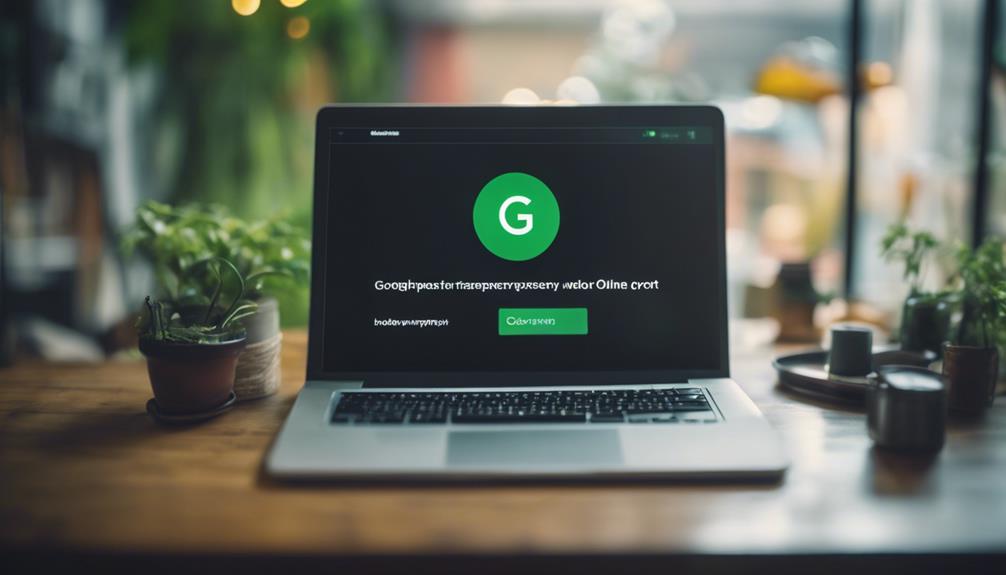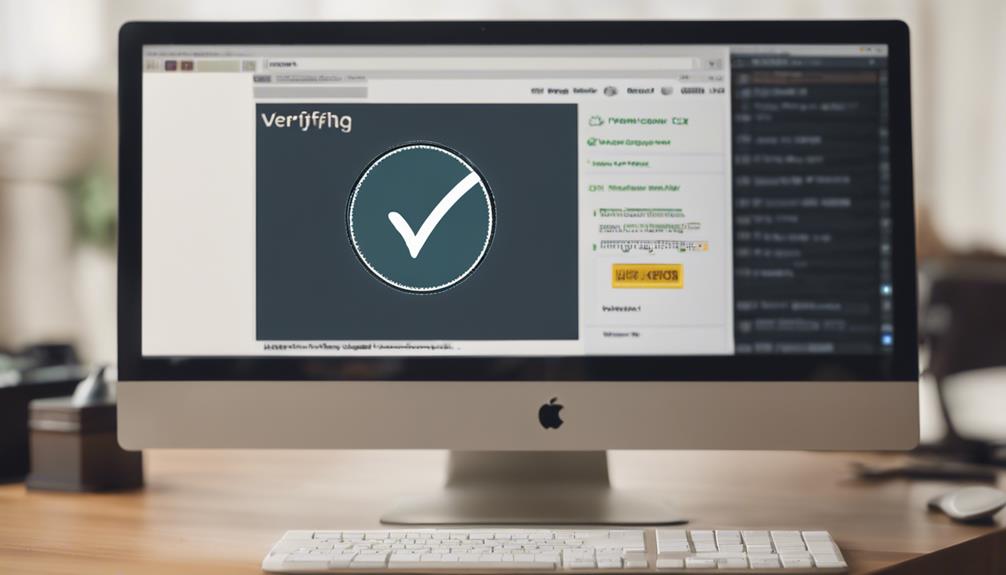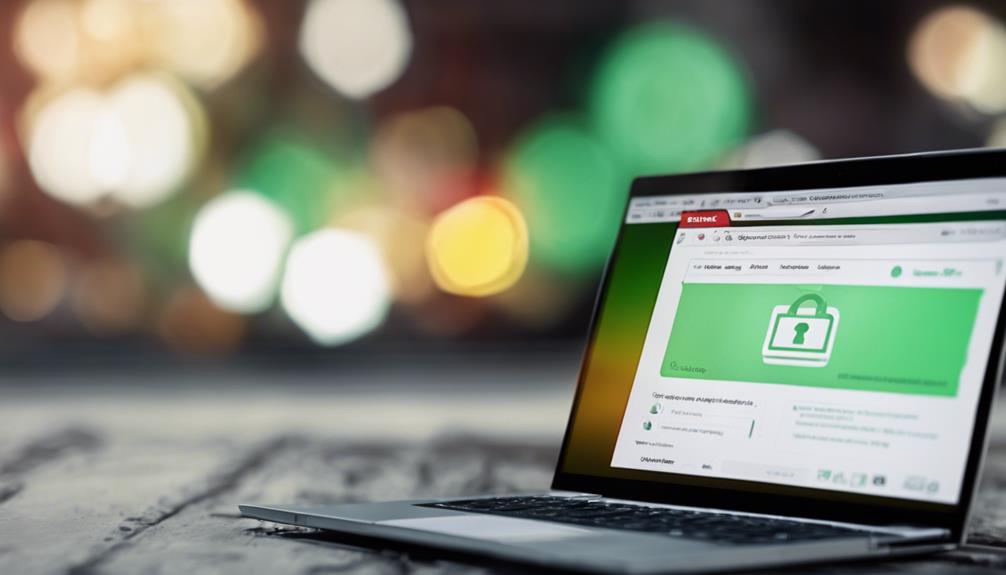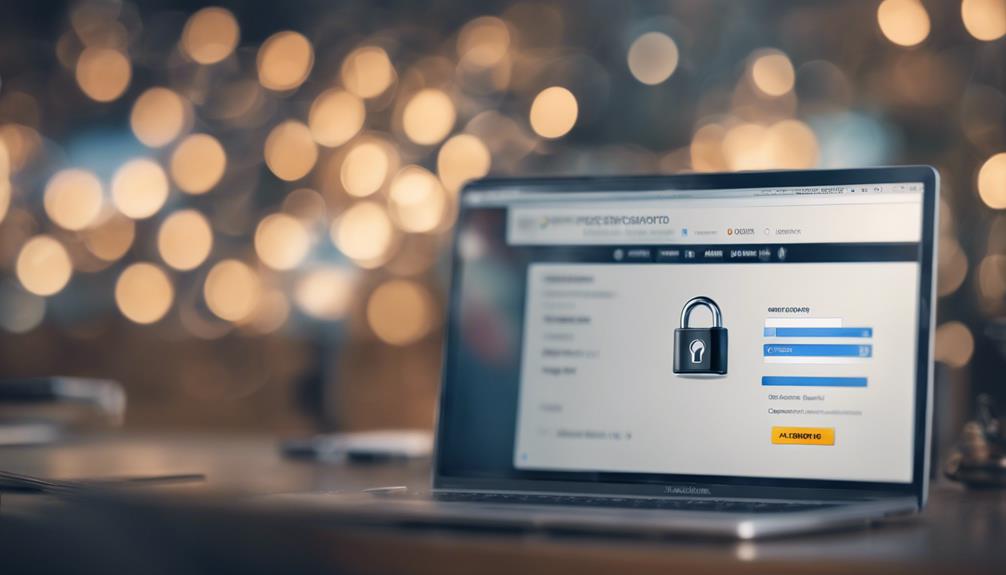To ascertain online store legitimacy and safety, first, look for trust seals like McAfee WebAdvisor to guarantee cybersecurity. Google Transparency Report flags unsafe sites, aiding decision-making. Scrutinize social media engagement and contact details for transparency and accessibility. Confirm a physical address for credibility using tools like Google Maps. Assess website appearance for professionalism, high-res images, and user-friendliness. Third-party reviews and company reputation validate trustworthiness. Utilize McAfee WebAdvisor for added online security. These eight methods offer a robust strategy for safe and legitimate online shopping experiences. Learn how to safeguard your digital transactions and personal information effectively.
Key Takeaways
- Verify SSL encryption and trust seals for cybersecurity.
- Check Google Transparency Report for site safety.
- Ensure active social media presence and reliable contact info.
- Confirm physical address legitimacy through Google Maps.
- Analyze professional website design and authentic product images.
Use McAfee WebAdvisor for Safe Sites
When shopping online, consumers can enhance their security by using McAfee WebAdvisor to identify safe websites. This tool acts as a shield against adware, spyware, viruses, and phishing scams that can compromise personal information and financial security during online transactions. By flagging potential threats and unsafe sites, McAfee WebAdvisor helps users distinguish between legitimate websites that use SSL encryption to protect data and malicious sites that aim to deceive shoppers. This added layer of security offers peace of mind and guarantees a safer online shopping experience.
McAfee WebAdvisor is designed for quick download and easy installation across various browsers, providing continuous background protection while users browse the internet. Its functionality is essential in safeguarding sensitive information and preventing cyber attacks that target unsuspecting online shoppers. By utilizing this tool, consumers can feel more confident in their online shopping endeavors, knowing that they've an extra measure of security in place to protect their personal and financial details.
Verify Website's Trust Seal

Trust seals play an important role in assuring online shoppers of a website's trustworthiness and security. Different types of trust seals, such as those from Better Business Bureau, PayPal, or Google, can enhance a site's credibility.
Verifying the legitimacy of a trust seal by clicking on it's a recommended step to guarantee safe online transactions.
Trust Seal Importance
Ensuring a website's legitimacy can be greatly enhanced by verifying the presence of a trust seal. Trust seals play an important role in confirming the credibility of a website and demonstrating its commitment to cybersecurity.
By clicking on a trust seal, users can undergo a verification process that assures them of being on a secure site, which is essential for protecting sensitive information during online transactions. These trust seals are typically issued by reputable entities such as the Better Business Bureau, PayPal, or Google, enhancing the level of trust users can place in a website.
An authentic trust seal not only signifies secure transactions but also contributes to building the website's overall credibility. However, it's important to note that while trust seals are significant indicators of a website's security measures, they shouldn't be the sole basis for determining credibility.
It's advisable to conduct additional research, especially when dealing with unfamiliar websites, before sharing any personal information.
Types of Trust Seals
Confirming a website's trust seal is essential for verifying its legitimacy and guaranteeing secure online transactions. Trust seals serve as indicators that a website has undergone security checks and prioritizes cybersecurity to provide a safe platform for transactions.
By clicking on the trust seal, users can verify the authenticity of the website, giving them confidence that they're engaging with a secure site. These trust seals are typically displayed by reputable sources such as the Better Business Bureau, PayPal, or Google, adding an extra layer of assurance for users.
While trust seals play a vital role in enhancing trust and security, it's important for users to conduct additional research, especially on unfamiliar websites, before sharing personal information. By combining the verification provided by trust seals with personal research, users can better protect themselves from potential cyber threats and guarantee a safe online shopping experience.
Verify Trust Seal
To authenticate the legitimacy of an online store, users can verify the website's trust seal. Trust seals play an important role in prioritizing cybersecurity by confirming that a website has undergone security checks and is safe for transactions. By clicking on the trust seal, users can obtain verification that they're on a secure site, ensuring their sensitive information is protected. These trust seals typically come from reputable sources such as the Better Business Bureau, PayPal, or Google, instilling confidence in the site's credibility.
While trust seals enhance trust and provide a level of assurance, it's important to note that they alone aren't sufficient for determining a website's overall credibility. Users should consider other factors such as customer reviews, domain age, and secure payment options to make a well-rounded assessment of an online store's legitimacy. By combining these elements, shoppers can shop online with confidence, knowing they're making transactions on a secure and trustworthy platform.
Check Google Transparency Report

Google Transparency Report, powered by Safe Browsing technology, serves as a reliable resource for identifying unsafe websites and potential risks on the Internet. This tool provides warnings for compromised sites, with alerts that may appear as pop-ups in browsers and search engines.
Users can utilize the report to check specific URLs for safety alerts and assess the credibility of online platforms. By highlighting unsafe online platforms, the Google Transparency Report assists users in making informed decisions about the trustworthiness of websites they visit.
This report is a valuable asset for individuals seeking to guarantee the safety and legitimacy of online stores before making purchases. It's essential to consult such resources to safeguard personal information and avoid falling victim to malicious online activities.
Assess Social Media Presence

Determining online store legitimacy involves examining the social media presence of the company for signs of authenticity and credibility. When evaluating a company's social media presence, there are key factors to take into account:
- Look for a genuine following and engagement on social media platforms. Legitimate companies typically have active interactions with their followers, responding to comments and messages promptly.
- Check for transparency in posts and interactions with customers. Authentic companies are open about their products, services, and any potential issues, fostering trust among their online community.
- Beware of phony reviews and suspicious links shared on social media. Some companies engage in unethical practices, such as buying fake reviews or sharing misleading links, which can be red flags for potential customers.
Review Contact Information

When evaluating the legitimacy of an online store, examining the contact information is crucial. Verifying contact details, checking for responsiveness, and confirming the physical address are essential points to take into account.
Authentic and clear contact information enhances the credibility and trustworthiness of an online store for potential customers.
Verify Contact Details
To validate the legitimacy of an online store, confirming the contact details provided is vital. Legitimate online stores prominently display contact information like a physical address and phone number. Here are three key factors to ponder when verifying contact details:
- Physical Address: A genuine online store will have a physical address listed on their website. Use tools like Google Maps to verify the store's location and ensure it matches the address provided.
- Phone Number: Legitimate online stores also provide a phone number for customer inquiries. Calling the number to confirm its validity can help establish the store's credibility.
- Accessibility: Reputable stores make their contact information easily accessible for customers. Lack of clear contact details or inaccessible customer service options could signal a lack of legitimacy.
Checking and verifying contact details is an essential step in guaranteeing the credibility and trustworthiness of online stores.
Check for Responsiveness
Examining the online store's contact information for responsiveness is crucial in evaluating its legitimacy and reliability. Legitimate online stores will provide clear and accessible contact information, including a customer service email, phone number, and physical address. By checking the responsiveness of this contact information, shoppers can guarantee they're dealing with a trustworthy online store.
Responsive customer service options are indicative of a legitimate business that values customer satisfaction and is likely to address any concerns promptly. On the other hand, a lack of responsiveness or unclear contact details can be red flags for potential scams or fraudulent activities.
To verify the legitimacy of an online store, it's recommended to test the provided phone number and email for responsiveness. Additionally, using tools like Google Maps to confirm the store's physical address can further validate its credibility. Overall, a responsive and transparent approach to contact information is a key indicator of a safe and legitimate online shopping experience.
Confirm Physical Address
When evaluating the validity of an online store, one key aspect to consider is confirming the provided physical address as part of reviewing the contact information. Legitimate online stores typically offer a physical address and phone number for contact information, enhancing their credibility and trustworthiness. To verify the accuracy of the physical address provided, using services like Google Maps to validate the store's location is recommended.
Here are three reasons why confirming the physical address is essential:
- Credibility Boost: A visible physical address enhances the online store's credibility, demonstrating transparency and a dedication to customer trust.
- Trustworthiness Indicator: Absence of clear contact information, including a physical address, may indicate an unsafe or illegitimate online store, urging caution.
- Safety Assurance: Reviewing the contact information, including the physical address, is vital for ensuring the validity and safety of the online store for secure transactions.
Analyze Website Appearance

Examining the appearance of a website is crucial in determining its legitimacy as a reliable online store. When evaluating a website, pay attention to the professional design and layout. Legitimate online stores invest in a user-friendly interface that's visually appealing and easy to navigate.
Look out for any typos or grammatical errors on the website. Scam websites often have poorly written content, which can be a red flag. Additionally, evaluate the quality of images used on the site. Authentic online stores typically use high-resolution images that showcase their products clearly.
Verify Company Reviews

To determine the legitimacy of an online store, verifying company reviews from reputable sources is essential. Authentic third-party reviews from sites like Trustpilot and Yelp provide valuable insights into the company's reputation. Checking multiple sources for reviews not only helps validate the credibility and trustworthiness of the online store but also offers a more thorough understanding of the overall customer experience.
Uniformly positive or negative reviews can be red flags for a fake website, indicating potentially manipulated feedback. Customer reviews play an important role in revealing information about the quality of products, customer service, and the overall online shopping experience. Researching company reviews from previous customers can greatly aid in making an informed decision before proceeding with a purchase.
Utilize McAfee WebAdvisor for Safety

For essential online security while shopping, consider utilizing McAfee WebAdvisor to protect against various cyber threats. McAfee WebAdvisor is a valuable tool that safeguards users from adware, spyware, viruses, and phishing scams that can compromise sensitive information during online transactions. The software offers a quick download process, easy installation, and compatibility with a range of browsers, ensuring convenience for users. By using McAfee WebAdvisor, individuals can enjoy background protection that enhances their online shopping safety.
Trusted by users globally, McAfee WebAdvisor plays an important role in identifying safe websites for secure transactions. Its reliable features help in safeguarding against cybersecurity threats, providing a safer online shopping experience overall. With McAfee WebAdvisor actively monitoring websites, users can browse and shop with confidence, knowing that they've an extra layer of protection against potential online threats. Make the most of McAfee WebAdvisor to enhance your online shopping safety and enjoy a worry-free experience on the web.
Frequently Asked Questions
How to Find Out if an Online Store Is Legitimate?
To determine if an online store is legitimate, one must assess various factors.
Look for a privacy statement, a physical address, and customer service options. Compare prices and investigate reviews. Checking the Better Business Bureau can also provide insight.
How Do I Know if an Online Store Is Safe?
To determine if an online store is safe, consumers can take several precautions. Look for a privacy statement outlining data protection measures. Check for a visible address and phone number on the website. Confirm the store accepts credit cards for secure transactions. Consider shopping from reputable retailers known for reliability. Be cautious of overly enticing deals, as they could signal potential risks.
How to Verify if a Website Is Legit?
To verify if a website is legit, one can check for a privacy statement outlining data protection measures. Look for a physical address and phone number as reputable sites display contact info prominently. Confirm the site accepts credit cards for secure transactions. Opt for trusted retailers to minimize risks, and be wary of unrealistically low prices which might indicate counterfeit goods or scams.
These steps can help users assess a website's legitimacy before making online purchases.
How Do I Make Sure My Shopping Website Is Legit?
To confirm a shopping website is legit, consumers should verify the presence of a privacy statement. They should also confirm the display of contact information and insist on credit card acceptance for secure transactions. Opting for reputable retailers and exercising caution with suspiciously low-priced deals are also crucial steps. These actions help safeguard against potential fraud and guarantee a safe online shopping experience.
Conclusion
In conclusion, when shopping online, it's vital to prioritize safety and legitimacy. By utilizing tools like McAfee WebAdvisor, verifying trust seals, checking Google Transparency Reports, evaluating social media presence, reviewing contact information, analyzing website appearance, verifying company reviews, and utilizing McAfee WebAdvisor for safety, consumers can protect themselves from potential scams and fraud.
Remember, an ounce of prevention is worth a pound of cure when it comes to online shopping.










